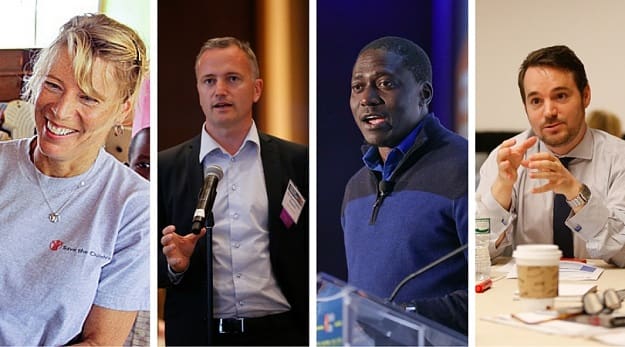In a recent blog, FSG’s Kyle Peterson discussed the 3 common traits that he’s observed in many of the shared value leaders we’ve gotten to know over the years. But what do these leaders think is crucial to creating shared value? We reached out to 4 shared value leaders from different organizations, sectors, and countries and asked, “What advice do you have for aspiring shared value leaders?”
Read their advice below, and let us know in the comments section what shared value questions you want to be answered next.
Carolyn Miles, president and CEO, Save the Children:
Think differently from the start—what are all ways you can leverage the skills of your organization along with your partners? And you want 2 “bottom lines”—a social good outcome plus a business outcome. When you develop a plan together, the result can be powerful – like a better life for children growing up in poverty and a more educated potential customer base. Sometimes it takes a more patient outlook than a quick “deal” though so be ready to stick with it—maybe for years.
Ole Kjerkegaard Nielsen, director of corporate sustainability, Novo Nordisk:
- See the value leaks in your business interactions
- Harness the creative power in your organisation
- Align with social needs – seek inspiration in the SDGs
- Reach out to partners who see the opportunity and share the problem
- Engage in the partnership – take the time to get it right (but make sure to capture easy wins that can motivate for bigger achievements)
- Drive the change – and capture the impact
Allan Pamba, vice president for East Africa, GlaxoSmithKline:
Take a moment to empathise with each of your key stakeholder groups especially end customers—both existing and potential, you will learn a lot in such reflection. Put yourself in their shoes and try and look at your organization through the lens of their eyes—do you still feel as proud of your business model? Could you be a better partner to you stakeholders? Insights from such an exercise could be what will position you ahead of competition over time.
Shared value is a sound business strategy which should deliver a competitive edge when implemented well. You will be at the cutting edge of change. At the start, it will feel slower riskier and even disadvantageous in the competitive business environment. Be brave and stay the course. In the long run, you will emerge victorious as business is mostly a marathon, not a sprint.
The world needs more Leaders who successfully drive both their institutions and society forward on their watch. We can all make our careers count in this way. This is hitching your wagon on something greater than just what everybody expects or thinks possible. Shared value moves us from the instinctive “what is in it for me?” to the more inclusive “what is in it for us?”
Mark Thain, vice president of social innovation, Barclays:
Successfully creating shared value at scale can sometimes involve unlearning much of what we know about our business models today, looking towards unconventional partnerships and testing entirely new ways of doing business.
The rewards of getting it right are huge, with the ability to leverage infrastructure, resources and the experienced marketing machine of successful businesses to scale profitable new products at lightning speed. But the barriers facing those fledgling business ideas are stacked equally high, with short-term planning horizons, a limited risk appetite and the many competing priorities vying for any available resources.
To help create the enabling environment for shared value innovation at Barclays, we launched a dedicated Social Innovation Facility in 2012. This is helping us accelerate the development of new products and services that will grow our business in a way that has lasting and scalable social impact. The facility provides a safe space to test and learn from new business models, alongside dedicated resources and an investment horizon that enables our teams to think outside the constraints of normal reporting cycles and lay the seeds for the next wave of innovation and growth within the company.

